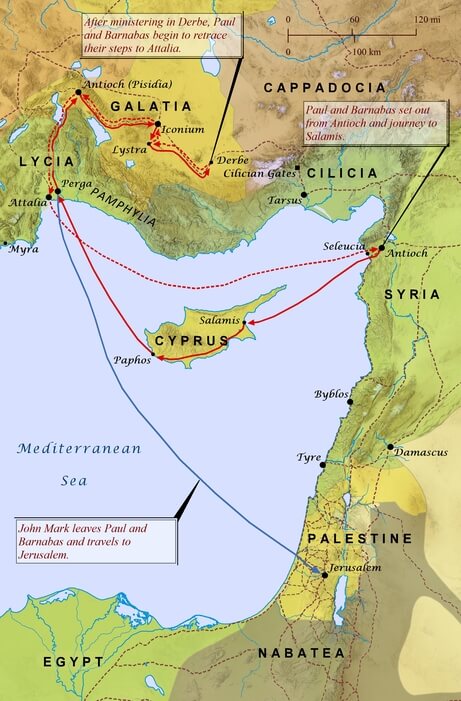Paul discusses his past and how he came to believe the true gospel. He also begins to cite his actions after receiving his commission from Jesus, cementing the fact that his authority comes directly from God, and that he is not subordinate to any body of men.
Before Paul was an apostle of Jesus, he was a very obedient and knowledgeable Jew who had learned the law, the traditions of his ancestors, and advanced in Judaism beyond many of his peers. He is establishing this fact to remind his audience that he understands the laws and traditions of Judaism better than most. Paul clearly can address the twisted gospel that these Jews are presenting to the Gentiles with authority, since he is an expert in the ways of the competing Jewish “authorities.”
Not only did Paul know the Jewish religion backwards and forwards, but before he became a believer in Jesus as the Christ, he felt it was his duty as a Jew to hunt down those of the early Church and silence them from spreading the gospel. These Jews saw Jesus as a blasphemer (claiming to be God when, as they believed, He wasn’t). Because of this, they killed Jesus and continually sought to imprison members of the early church. We see a bit of this persecution from Paul in chapters 7, 8, and 9 of Luke’s account of the early Church in the book of Acts.
Paul had condoned the stoning of Stephen who was murdered for proclaiming the gospel (Acts 7) and went “house after house…dragging off men and women and would put them in prison” (Act 8:3). He was a vicious persecutor of the early Church.
But while Paul was traveling to Damascus to arrest believers there and bring them to Jerusalem, Jesus appeared before him:
“Suddenly a light from heaven flashed around him; 4 and he fell to the ground and heard a voice saying to him, “Saul, Saul,* why are you persecuting Me?” 5 And he said, “Who are You, Lord?” And He said, “I am Jesus whom you are persecuting, 6 but get up and enter the city, and it will be told you what you must do” (Acts 9:3b-5).
(*Saul is Paul’s Hebrew name).
In the first two chapters of Galatians we only see a snippet of Paul’s journey to becoming an apostle and beginning his ministry to the Gentiles (non-Jews). In the introduction of this letter, Paul is establishing that his authority and gospel message were given to him from God, not man, and showing these Galatians how God had been using him to further the good news.
When Paul got his commission from Jesus, he did not run to Jerusalem to have it confirmed by any other Jewish authorities, not even the twelve apostles or the elders of the Jerusalem church. He did not do so because he did not need to do so. Paul’s authority came directly from Jesus. Paul will now tell us that he did not confer with Peter (the lead apostle of the twelve) for another three years, and even then not to gain any sort of endorsement. This is because Paul is equal in authority to the twelve, with respect to his ministry to the Gentiles.
Biblical Text
13 For you have heard of my former manner of life in Judaism, how I used to persecute the church of God beyond measure and tried to destroy it; 14 and I was advancing in Judaism beyond many of my contemporaries among my countrymen, being more extremely zealous for my ancestral traditions. 15 But when God, who had set me apart even from my mother’s womb and called me through His grace, was pleased 16 to reveal His Son in me so that I might preach Him among the Gentiles, I did not immediately consult with flesh and blood,17 nor did I go up to Jerusalem to those who were apostles before me; but I went away to Arabia, and returned once more to Damascus.
Check out our other commentaries:
-
Luke 15:11-24 meaning
Jesus told three parables in response to the Pharisees and scribes grumbling at how He mingles with sinners. This third parable is often called “The...... -
Leviticus 19:19-32 meaning
God gives several very specific instructions to the Israelites...... -
Matthew 12:9-14 meaning
Matthew narrates the second of four confrontations between Jesus and the Pharisees. The Pharisees set a trap for Jesus relating to the healing of a...... -
Daniel 6:6-9 meaning
The other rulers convince the king to sign a decree that prohibits petitioning anyone besides the king. ...... -
Ecclesiastes 2:24-26 meaning
Solomon turns from the frustration of failing to find meaning through reason and experience. He discovers meaning and purpose through a life of faith and......



